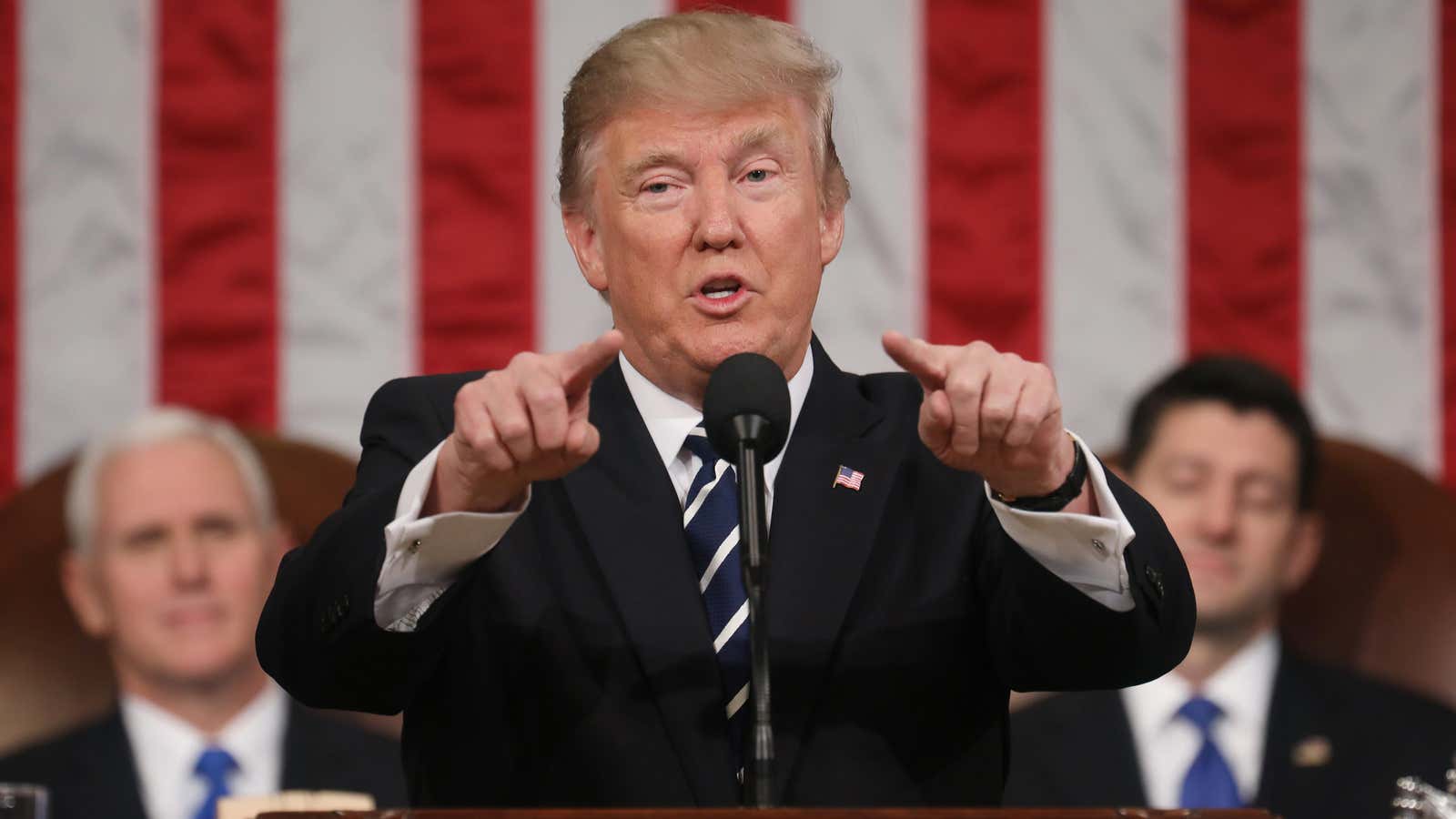In substance, US president Donald Trump’s first speech to a joint session of Congress differed little from his “American carnage” inauguration message on Jan. 20.
US citizens still live in “an environment of lawless chaos.” Infrastructure is still “crumbling.” Industries are still “dying.” And the country still suffers a “terrible drug epidemic.”
But tonight (Feb. 28), Trump brought something new to Congress: The doom, the gloom, and the apocalyptic talk was wrapped in an unexpected message of hope.
There were passages like this:
“A new chapter of American greatness is now beginning. A new national pride is sweeping across our nation. And a new surge of optimism is placing impossible dreams firmly within our grasp,” he said.
And this:
Everything that is broken in our country can be fixed. Every problem can be solved. And every hurting family can find healing, and hope.
There were semblances of olive branches to those outside his base. He began the speech by promising “unity,” offered nods to “women’s health,” to helping “struggling…immigrant families enter the middle class,” and to promoting “clean air and clean water.” As to what all that meant in terms of policy, we were none the wiser.
The question is whether the public will buy one message of optimism after two years of hysteria, one sighting of a measured Trump confident in his country after years of his obsessing over a “failing” America being ripped off.
The practical promises bore little change at all. There was still the economic nationalism, the calls for deregulation, for enlivening American coal and steel despite economic realities—all without the details that Congress, investors, and the public at large have been crying out for on matters ranging from health care to tax reform.
There’s no escaping the fact that Trump does doom and gloom really well. But optimism and unity? Outside his opening gambit tonight, the platitudes felt just that, half-hearted and clunky. Check out this sentence:
“True love for our people requires us to find common ground, to advance the common good, and to cooperate on behalf of every American child who deserves a much brighter future.”
The language is passive, the phrasing lackluster, and the verbs (“requires,” “advance,” “cooperate”) all of Latin origin—evoking staid officialdom rather than the gut-punching Anglo-Saxon he normally uses. Take, for example, “Make America great again.” Every word except for the latinate “America,” is short, punchy, has hard consonants and is the simplest of any synonym you can find in the English language. A more typically Trumpian take would be:
“Let’s use our love for our fellow Americans to work for what we all want, make everyone win again, and pull together so every American kid has a brighter future.”
And it wasn’t only the language—Trump just didn’t seem to be able to put his heart into this attempt at warmth and fuzziness. He certainly bore a presidential tone, but didn’t manage the soaring notes of hope that an Obama or a Clinton or a Reagan could easily find, and couldn’t get out of first gear without the anger he normally channels. It’s not an adjective you would normally associate with him, but, frankly, this presidential Trump came across as…a touch boring.
But the latest iteration of the ever-morphing Trump did seem to please the applauding congressional Republicans whom he’d alienated in his first 40 days in office.
However, if the new act is aimed at convincing people like the woman in this CBS focus group—who quipped, “I’m gonna go on Twitter tomorrow and see what he really thinks”—then he can’t return tomorrow to bashing the media as the “enemy of the people” and making baseless claims that Obama is helping organize protests against him.
